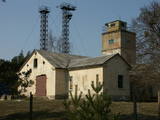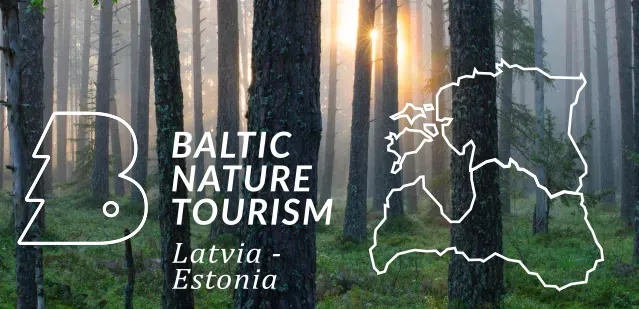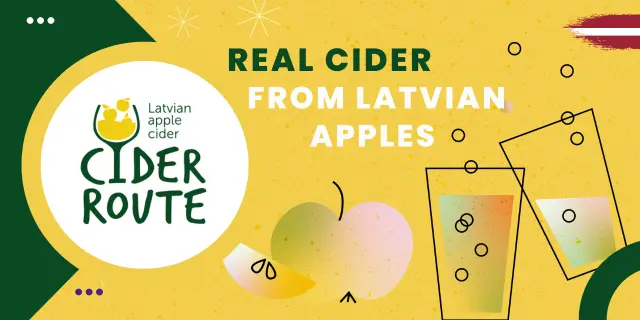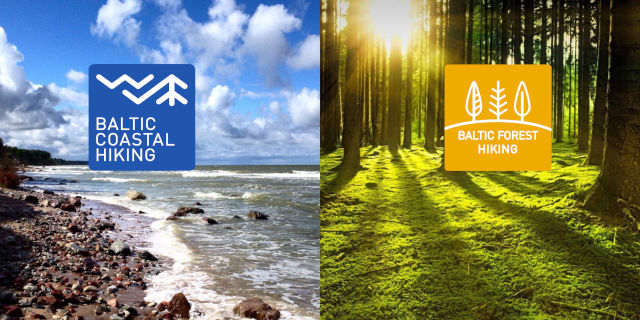Border guard washerwoman
To get it white, I used the silicate glue, which was available in 0.5 l bottles. A friend from Siberia taught me. I had a big caldron, 16 litres, and I used to put one bottle of that glue in it so that the clothes got very white. Every day I laundered one caldron. I tried to arrange my Sundays free. In the beginning I also used to buy washing soda, it was cheap. <br>
After some time they brought a posh washing machine, but it was not for a countryside place, as it had to be connected to water pipes and sewage. We still do not have such installations in this house. Then they brought another washing machine, “Rīga-8”, but this was to wash handkerchiefs, not army clothing.
I came to Kolka in 1952 from Vīdales Cirsti, there were about 40 farmsteads at that time. I lived for some time in a little house by the school; we were four families there and very little space. After some time I moved to Uši, 6km away from Kolka. I lived for three and a half years in the „Tirguslauki” house and then I moved here, to the „Priesteri” house. I live in this house since 1956 and in this flat (second floor) since 1962.
My sister worked in the Kolka post office. I had no job, no husband. We divorced because it was like sometimes I had a husband and sometimes I had not. So I decided that I could do better without one at all. I had no idea how difficult it will be – to be single with two kids at schooling age. Anyway, I was determined and that was it. In the beginning, I worked for local fishermen, like for Viktor of the Bertholds here.
Then I started to wash clothes and linen for the border guard, they took the laundry to my place. The postmaster Krasnovaya and my sister persuaded me to take this job as border guards had been looking for someone who could do it. I could speak some Russian but I could not write and fill in any papers. I met with their starshina in the post office and made a deal. Before me, a woman from Pitrags village was doing the job. So I started from the 1st of March. The soldiers who were taking the laundry said why I do not ask for a flat in Kolka, there was one free there. I was shy first, but once when they brought my wages, I decided to ask.
I moved in here on October 20, 1956. The flat on the first floor was quite terrible. The windows were from German bunkers. They were of different sizes and it did not look well. The house was actually owned by nobody. Now it belongs to the Kolka Orthodox church. Russian officers lived here. The room was cold, my children young. The youngest did not go to school yet, the oldest was in the first school year. There was a wood stove in the kitchen and a chimney, but the stove did not have a damper to keep the warmth, and there was no heating in the room. Before me, Marchenko, the doctor lived here. Her husband was a sergeant in the border guard. There was a small room separated by a partition, made from slab wood. I wondered how the doctor could live here. They moved to the “Kristi” house in Kolka. There was a small hospital in Kolka, the doctor worked there.
I was laundering for 40 border guards: shirts, pants, underwear, bed linen, foot-cloths. I did not have to wash their uniforms. It was hard to wash the foot-cloths, as they got awfully dirty in those Kirza boots.
To get my little flat in a little bit better shape I cheated out some cardboard boxes from the factory and covered the partition slabs with it. I needed more place where to dry the laundry. I had two ropes in my room – one along my bed, another – in the other side. Downstairs, in the corridor, they immured a caldron to heat water. At Uši I was doing the laundry in the yard. The big caldron was hanged on a hook and I boiled the laundry on the fire.
They gave some washing powder but it was not enough, I bought more myself. The norm was 8-10 grams per kilogram. A bed sheet was counted as 250 grams, but it was a clean one. The laundry was not always weighed. At first, I got 15 roubles per month. We have to manage, all three of us. I could not go work in the factory, as I could not leave the kids alone. Here the school was next doors so I could keep an eye on them. When the officers went to the new house, I could move into the flat on the second floor.
The officers had pigs in a shed by the house. When they left, it was turned into a laundry house for me. They installed a stove and that was all equipment. It was warm in the steam. Just put on your rubber boots every dear day and go.
In the beginning, there was no electricity. I used coal irons. My friends said that I toil too much with that ironing. Then I started just fold and press the sheets, but I still ironed the shirts, pants and pillowcases. I had two small brown stools, and I used them to press the folded sheets. There were 80 sheets every time, two sheets for a bed.
I was laundering for 15 roubles a month for some 3-4 months. The starshina was a reasonable man, and he added something to the laundering list, as if I was laundering the cook’s dresses every day. The most important support was that I got lunch and dinner every day as 15 roubles a month was not enough to feed three people.
Hard it was to rub on a washing board. I used up some four boards. Drying the laundry was crazy, especially in winter. The clothes would not get dry, they just froze and that was it. I was drying the laundry outdoors, in zastava, by the school, near stables and pig house. Walking through stables, I could get to the gym. I used to dry the laundry there in winter. I had to carry it, half frozen, both ways every day. 10 sheets over a shoulder and across the field. Later I dried it opposite the Lutheran church at “Vagari” house by Dzidra Berzina. But there I had to carry it up the stairs to the loft. Another drying place was a former coach-house behind the church. Seems there is no house in Kolka where I had not been drying that laundry. Then I could carry and dry the laundry anywhere but not now. Not because I am not strong enough. This is because you cannot trust people here anymore, somebody could steal it.
I had four lines here, by the church. In winter, if I hang it out on Monday, the laundry was dry until Thursday. It was easy in the summer.
I did not have to launder for officers, they did it themselves.
Crazy as I was, for a while I was laundering for the marines, too. They were some 16 men. The striped shirts were easy, but those tarpaulin clothes were hard as wood. I did not wash them by hands. They brought their washing machine “Tula”, and I washed by one piece at a time. Sometimes they were very dirty but it was a challenge for me to get them clean. Later I washed also for construction workers, some 30 men. For a while, I washed also for the lighthouse men.
I carried water from the well. First, I had to bring it in and then carry out. The most difficult it was to wring the wet laundry.
To get it white, I used the silicate glue, which was available in 0.5 l bottles. A friend from Siberia taught me. I had a big caldron, 16 litres, and I used to put one bottle of that glue in it so that the clothes got very white. Every day I laundered one caldron. I tried to arrange my Sundays free. In the beginning I also used to buy washing soda, it was cheap. After some time they brought a posh washing machine, but it was not for a countryside place, as it had to be connected to water pipes and sewage. We still do not have such installations in this house. Then they brought another washing machine, “Rīga-8”, but this was to wash handkerchiefs, not army clothing.
This way I worked 28 years, until 1984. I was 30 when I started this job, and I was 58 when I finished. I retired at 77. All the time I had two jobs. I did an extra job as a watch in the bakery.
My working day started at 4 in the morning. I would make fire to heat up water in the caldron, make breakfast for my kids and see them off to school, then I did the laundry and then, at 12, to the bakery where I worked until 5 p.m. In the evening, I got to ironing.
I had a boyfriend, he was a soldier. His mother came from Leningrad and stayed here for a couple of weeks. She brought many presents for me and invited me to Leningrad for the New Year’s Eve. I had never been to Riga, and I dared going to Leningrad. I was just over 40. Such a crazy thing! She took me to all the beautiful places – the Hermitage, the Petropavlovsk fortress. I could not have done it on my own – I had neither the money, nor possibilities. They invited me and paid the trip and my stay. We separated as I did not want to live in another country, and I did not want to live in the city at all. Dating was OK with me.
The military were very friendly to me. When they slaughtered a pig, their starshina always gave some meet to me.
The military did not employ civilians much. They tended their livestock themselves. In the beginning, they had three horses, and we called the soldier who looked after horses a horseman. Later they liquidated the horses. The last 10 years the border guards did not have pigs either.
Most of the officers were Ukrainians, these people are practical and know how to work. Siderenko, Ushnarenko – they were hardworking men. In the autumn, Ushnerenko got some cabbage and other things. He always had the cellar full with food staffs. These supplies were for soldiers, as extras to their normal food. He used to pickle apples. In large barrels, he put straw and apples in layers and poured a sweet-sour marinade. The apples tasted very good, they did not go bad.
My sister worked in the Kolka post office. I had no job, no husband. We divorced because it was like sometimes I had a husband and sometimes I had not. So I decided that I could do better without one at all. I had no idea how difficult it will be – to be single with two kids at schooling age. Anyway, I was determined and that was it. In the beginning, I worked for local fishermen, like for Viktor of the Bertholds here.
Then I started to wash clothes and linen for the border guard, they took the laundry to my place. The postmaster Krasnovaya and my sister persuaded me to take this job as border guards had been looking for someone who could do it. I could speak some Russian but I could not write and fill in any papers. I met with their starshina in the post office and made a deal. Before me, a woman from Pitrags village was doing the job. So I started from the 1st of March. The soldiers who were taking the laundry said why I do not ask for a flat in Kolka, there was one free there. I was shy first, but once when they brought my wages, I decided to ask.
I moved in here on October 20, 1956. The flat on the first floor was quite terrible. The windows were from German bunkers. They were of different sizes and it did not look well. The house was actually owned by nobody. Now it belongs to the Kolka Orthodox church. Russian officers lived here. The room was cold, my children young. The youngest did not go to school yet, the oldest was in the first school year. There was a wood stove in the kitchen and a chimney, but the stove did not have a damper to keep the warmth, and there was no heating in the room. Before me, Marchenko, the doctor lived here. Her husband was a sergeant in the border guard. There was a small room separated by a partition, made from slab wood. I wondered how the doctor could live here. They moved to the “Kristi” house in Kolka. There was a small hospital in Kolka, the doctor worked there.
I was laundering for 40 border guards: shirts, pants, underwear, bed linen, foot-cloths. I did not have to wash their uniforms. It was hard to wash the foot-cloths, as they got awfully dirty in those Kirza boots.
To get my little flat in a little bit better shape I cheated out some cardboard boxes from the factory and covered the partition slabs with it. I needed more place where to dry the laundry. I had two ropes in my room – one along my bed, another – in the other side. Downstairs, in the corridor, they immured a caldron to heat water. At Uši I was doing the laundry in the yard. The big caldron was hanged on a hook and I boiled the laundry on the fire.
They gave some washing powder but it was not enough, I bought more myself. The norm was 8-10 grams per kilogram. A bed sheet was counted as 250 grams, but it was a clean one. The laundry was not always weighed. At first, I got 15 roubles per month. We have to manage, all three of us. I could not go work in the factory, as I could not leave the kids alone. Here the school was next doors so I could keep an eye on them. When the officers went to the new house, I could move into the flat on the second floor.
The officers had pigs in a shed by the house. When they left, it was turned into a laundry house for me. They installed a stove and that was all equipment. It was warm in the steam. Just put on your rubber boots every dear day and go.
In the beginning, there was no electricity. I used coal irons. My friends said that I toil too much with that ironing. Then I started just fold and press the sheets, but I still ironed the shirts, pants and pillowcases. I had two small brown stools, and I used them to press the folded sheets. There were 80 sheets every time, two sheets for a bed.
I was laundering for 15 roubles a month for some 3-4 months. The starshina was a reasonable man, and he added something to the laundering list, as if I was laundering the cook’s dresses every day. The most important support was that I got lunch and dinner every day as 15 roubles a month was not enough to feed three people.
Hard it was to rub on a washing board. I used up some four boards. Drying the laundry was crazy, especially in winter. The clothes would not get dry, they just froze and that was it. I was drying the laundry outdoors, in zastava, by the school, near stables and pig house. Walking through stables, I could get to the gym. I used to dry the laundry there in winter. I had to carry it, half frozen, both ways every day. 10 sheets over a shoulder and across the field. Later I dried it opposite the Lutheran church at “Vagari” house by Dzidra Berzina. But there I had to carry it up the stairs to the loft. Another drying place was a former coach-house behind the church. Seems there is no house in Kolka where I had not been drying that laundry. Then I could carry and dry the laundry anywhere but not now. Not because I am not strong enough. This is because you cannot trust people here anymore, somebody could steal it.
I had four lines here, by the church. In winter, if I hang it out on Monday, the laundry was dry until Thursday. It was easy in the summer.
I did not have to launder for officers, they did it themselves.
Crazy as I was, for a while I was laundering for the marines, too. They were some 16 men. The striped shirts were easy, but those tarpaulin clothes were hard as wood. I did not wash them by hands. They brought their washing machine “Tula”, and I washed by one piece at a time. Sometimes they were very dirty but it was a challenge for me to get them clean. Later I washed also for construction workers, some 30 men. For a while, I washed also for the lighthouse men.
I carried water from the well. First, I had to bring it in and then carry out. The most difficult it was to wring the wet laundry.
To get it white, I used the silicate glue, which was available in 0.5 l bottles. A friend from Siberia taught me. I had a big caldron, 16 litres, and I used to put one bottle of that glue in it so that the clothes got very white. Every day I laundered one caldron. I tried to arrange my Sundays free. In the beginning I also used to buy washing soda, it was cheap. After some time they brought a posh washing machine, but it was not for a countryside place, as it had to be connected to water pipes and sewage. We still do not have such installations in this house. Then they brought another washing machine, “Rīga-8”, but this was to wash handkerchiefs, not army clothing.
This way I worked 28 years, until 1984. I was 30 when I started this job, and I was 58 when I finished. I retired at 77. All the time I had two jobs. I did an extra job as a watch in the bakery.
My working day started at 4 in the morning. I would make fire to heat up water in the caldron, make breakfast for my kids and see them off to school, then I did the laundry and then, at 12, to the bakery where I worked until 5 p.m. In the evening, I got to ironing.
I had a boyfriend, he was a soldier. His mother came from Leningrad and stayed here for a couple of weeks. She brought many presents for me and invited me to Leningrad for the New Year’s Eve. I had never been to Riga, and I dared going to Leningrad. I was just over 40. Such a crazy thing! She took me to all the beautiful places – the Hermitage, the Petropavlovsk fortress. I could not have done it on my own – I had neither the money, nor possibilities. They invited me and paid the trip and my stay. We separated as I did not want to live in another country, and I did not want to live in the city at all. Dating was OK with me.
The military were very friendly to me. When they slaughtered a pig, their starshina always gave some meet to me.
The military did not employ civilians much. They tended their livestock themselves. In the beginning, they had three horses, and we called the soldier who looked after horses a horseman. Later they liquidated the horses. The last 10 years the border guards did not have pigs either.
Most of the officers were Ukrainians, these people are practical and know how to work. Siderenko, Ushnarenko – they were hardworking men. In the autumn, Ushnerenko got some cabbage and other things. He always had the cellar full with food staffs. These supplies were for soldiers, as extras to their normal food. He used to pickle apples. In large barrels, he put straw and apples in layers and poured a sweet-sour marinade. The apples tasted very good, they did not go bad.
| Tourism objects involved in this story | ||
|---|---|---|
Obwohl heutzutage das Kap Kolka für alle Interessenten und Touristen zugänglich ist, funktioniert der Grenzwacheposten immer noch und ist für die Zivilpersonen nicht zugänglich. |
||









